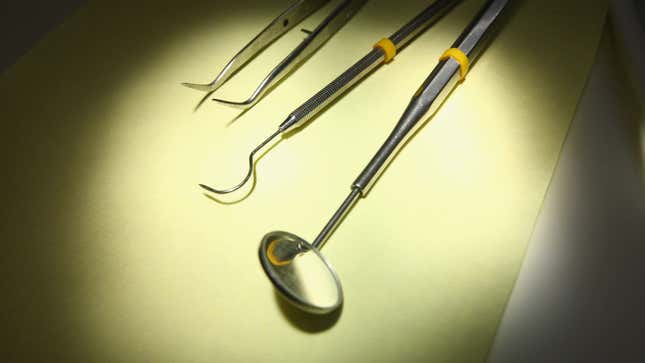
A dentist in Perth, Australia has received two months in jail for treating 41 patients while she was supposed to be in two weeks of mandatory self-quarantine to prevent the spread of covid-19. The judge’s sentence is the harshest covid-related punishment passed down in Australia since the pandemic began earlier this year, with most people receiving fines for infractions.
The dentist, identified by Australia’s ABC News as Natalia Nairn, flew home to the state of Western Australia from the capital city of Canberra back in June. Nairn reportedly left her home on at least seven occasions to visit her dental clinic and saw 41 patients. At least one of those visits occurred after she’d already been visited by police.
Nairn told the judge that she didn’t think she had to self-quarantine because she was “feeling fine,” but the judge, Matthew Walton, called her excuses, “staggeringly naive or at the very least irrelevant.” Nairn eventually pleaded guilty and was sentenced today to seven months in prison, with five months of her sentence suspended, according to ABC News.
The state of Western Australia was the first to set up what it calls a “hard border” with Australia’s other states, requiring any residents returning to the state to self-quarantine for two weeks. Non-residents of the state have been completely forbidden from traveling to Western Australia without a special exemption, such as the need to take care of a loved one.
Australia’s other states have followed Western Australia’s lead, setting up checks for interstate travel within Australia, though those restrictions have changed over the past six months based on which part of the country is currently experiencing an outbreak. The strategy has paid off for Australia, which reported just six cases of coronavirus on Sunday and no deaths.
Australia has identified 27,658 cases and 907 deaths since the pandemic began, a relatively low figure compared to the U.S. and Europe. The state of Victoria saw a huge surge in cases this past July and August and the Premier (Australia’s version of a state governor), enacted a strict lockdown to crush the case curve. Australia also took extra financial steps to make sure people could stay home, including a boost for unemployment benefits, three months of free childcare, and wages for those who’ve been furloughed.
There were complaints and protests in Victoria over the past few months, but the lockdowns worked and most of Australia is starting to return to normal life. In Western Australia, which hasn’t seen a case of community infection since May, life looks pretty much exactly as it did before the pandemic struck, with restaurants and businesses open at full capacity, and sporting events hosting thousands of spectators.
The U.S., by contrast, saw 102,588 new cases yesterday, the largest ever recorded on a Sunday, which is typically lower than other days of the week because of how states report their statistics. The U.S. also saw 462 deaths yesterday.
The U.S. has the highest case count and the worst death toll in the entire world from covid, with over 9.9 million infections and at least 237,000 deaths, according to Johns Hopkins University’s online coronavirus tracker. And things are only going to get worse in the next two months, according to public health experts, as the colder weather pushes more people indoors and large family gatherings become more common during Thanksgiving and Christmas.
“It’s going to spread, but it doesn’t need to spread at the levels and at the velocity that’s going to start to press the health care system, which is what we’re seeing,” former FDA commissioner Scott Gottlieb said on Face the Nation yesterday.
“We’re seeing that in Wisconsin now. It’s building field hospitals. Utah’s building field hospitals. El Paso built their fourth mobile morgue. We now have... we’re going to have a record number of hospitalizations this week,” Gottlieb continued.
“Now, 56,000 people are hospitalized. 11,000 are in the ICU. These are very big numbers nationally, and it’s accelerating very quickly.”